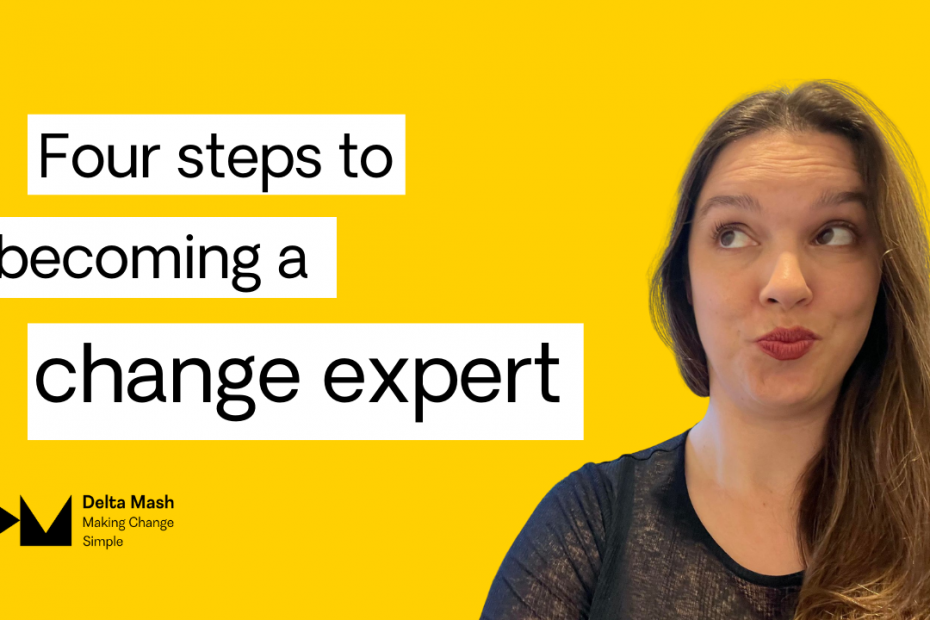You know, some change managers like to pretend that they have this whole “change approach” thing figured out…
These change managers show up on projects with a rigid vision and too many assumptions about how the change *should* be managed without customising their approach to their stakeholders or to the change.
Instead of tailoring their language to their audience, they generally use too much technical jargon because they think it will make them sound more like an expert and like they know what they’re doing.
But in actuality, those actions are overcompensating for some pretty big internal limiting beliefs about not being experienced enough or senior enough and needing to prove themselves. And trying to *sound* like a competent change manager instead of acting like one.
But can I tell you the funny thing?
The more ‘expert’ you get, the less you actually feel like you need to sound like an expert. Yep, it’s the truth.
Because… the best change managers actually *never* have their change approach fully figured out. Yep, *mic drop*
What the best change managers do have, is a set of tools, processes and techniques that allow them to walk into a change project or a situation, without a plan, even be put totally on the spot with no warning, and bring calm to the storm.
They have a set structure that can be quickly adjusted to meet the needs of their stakeholders, organisation and the change.
They feel comfortable about sailing into the unknown because they have the skills to constantly adjust their approach depending on what decisions are made, what roadblocks might pop up, and everything that’s going on in their stakeholder’s world.
They are actually pretty chill like “Yeah, I got this.” Because they sit comfortably knowing that they know what to do to create the answer.
These change managers are great at thinking on their feet when they meet resistance, able to quicky adjust their plan, deal with massive change risk, respond to change related questions on the spot in meetings, or deal with complex stakeholder situations… and so much more!
So, how do these totally boss, badass and incredibly effective change managers do this, you ask? And how do they do it quickly and *literally* on the fly?
Well, it’s your lucky day! Because I’m going to walk you through my super simple four-step system for expert situational analysis that will 10X your ability to navigate a clear path out of the unknown.
Sound good? 🙂
Awesome. Let’s dive into it.
Expert Situational Analysis
1. Assess the situation
First, you need to get clear on the situation at hand. WHY has this situation occurred? What outcomes are you trying to achieve?
Think about why are you involved and what your role is (or should be)? And what is the objective that needs to be reached?
2. Understand your audience
Identify who else is involved.
Consider why are they involved in this situation? Consider what their role is (or should be)?
What is their current understanding and emotional state? What influences them? What are their needs and what do they care about?
3. What’s worked/not worked in the past
As you start considering a solution, look at which tactics, people or approaches have been successful/not successful in the past, why was that?
Which past approaches are you most skilled at executing successfully?
4. Brainstorm your approach
Next, assess the above and consider different change strategies and tactics to determine the most appropriate approach. Share your insights with your team or stakeholders.
When a more considered approach is required, walk it through, brainstorm barriers or potential objections and prepare mitigation tactics and then build these into your approach in advance.
Use this four-step system and you will be able to comfortably bask in the unknown as you quickly assess your change situations and come up with thoughtful expert solutions.
Practice this, implement it, and don’t let fear of the unknown or ‘not sounding like an expert’ – or any other fears – get in the way of you becoming the expert you are destined to be.
Your stakeholders and team need you. Put yourself out there, bask in the unknown and then navigate your clear path.
You got this <3
To read more on this article see the Original Post Published Here
Content and Images Published by Jane Waterson via LinkedIn
